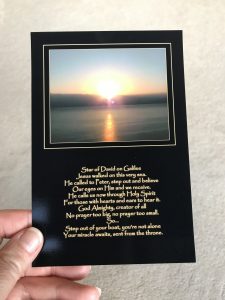The Boy in the Blue Shirt
This past week I chaperoned my sixth “Desperation” youth conference in Colorado. Some may call me a glutton for punishment. But they’d be mistaken. I am a privileged witness.
Every summer, several thousand teens gather in the shadow of the majestic Rocky Mountains to lift their eyes to the One who created those mountains. To cry out to the One who can move their mountains.
It just never gets old, seeing this generation rise up to take their place, with selfless faith. I never tire of watching them stand to worship the Living God, arms high and hearts abandoned.
The image I have each year as I survey the crowded auditorium is that of a vast field of wheat, swaying in the sunlight to the gentle rhythm of the wind. It’s an incredible sight to see.
This year, one particular stalk stood out in the sea of wheat: an unassuming, slim, teen boy wearing a t-shirt the color of a Colorado sky. This dude pulsated to his own internal beat, blissfully out of sync with the others. He was worshiping the Lord with extraordinary passion, completely unconcerned with his surroundings. A modern-day David, dancing before the Lord with all his might.
I was captivated by this beautiful example of consumed worship. That is, until he unknowingly backed up into a couple of steps in the aisle and fell, disappearing from view. I held my breath as several bystanders rushed to his aid and helped him to a nearby seat several rows in front of me. He appeared to be injured by his unexpected fall. For a moment he seemed to be shaken.
And then I watched, astounded, as he lifted his hands in his seat and simply continued worshiping. He wasn’t about to let a little stumble trip him up. No pain would prevent his praise.
Once again he reminded me of David, the psalmist, who frequently poured out his heartache and troubles to the Lord, but refused to allow them to silence his praise. David would cry out to God in the anguish of his soul, and in the next breath praise Him for His goodness and faithfulness. Nothing would keep him from worshiping his God.
I want to be more like that. Less distracted by my difficulties. More consumed by the character of the One who is Ever Worthy of my praise. Even in, especially in, my pain.
So thank you, boy in the blue shirt. For not caring what your peers think about you. For being willing to throw yourself fully into worshiping your King. For not letting anything stop you from lifting your hands in praise to the Most High God.
Thank you for leading me in worship.
But as for me, I will hope continually, And will praise You yet more and more. (Psalm 71:14, NAS)
*This song really seems to capture the determination to praise God, even when it hurts.











